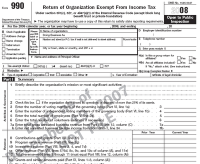**Updated January 2009**
Even if your nonprofit is lucky enough to have a November 30 year end there is still plenty of stuff you need to be doing right now to get ready for this new reporting form. This is a work in progress, some things will be added as we go but here is where it is so far:
THE NEW 990:
WHAT DO WE NEED TO DO RIGHT NOW?
Required Policies
Conflict of interest policy
- Procedures to determine when conflict of interest exists
- Details appropriate response when identify conflict
- Requires annual disclosure of conflicts of interest
- Ensures potential excess benefit transactions are scrutinized
- Requires periodic review of any transactions with insiders
Whistle-blower policy
- Procedures for addressing complaints from employees regarding financial improprieties or misuse of organization resources
Document retention and destruction policy
- Guidelines for maintaining and documenting storage and destruction of electronic and hard-copy files
- Outlines backup procedures and archiving of documents
Expense reimbursement policy
- Requires receipts (substantiation) for any expenses to be reimbursed
- Documents business purpose of any reimbursable expenses (e.g. first-class travel, spousal travel, club memberships, personal services)
- Document business usage of any corporate assets (e.g. cell phones / laptops)
Non-standard gift acceptance policy
- Requires review of any non-standard gifts
- Provides for substantiation of cash contributions in excess $250
- Provides for periodic monitoring or compliance under state charitable solicitation laws
Joint venture policy (only if applicable)
- Procedures to evaluate relationships with taxable entities and safeguard the exempt status of the tax-exempt organization
Policy regarding chapters and affiliates (only if applicable)
- Ensure activities and operations of affiliates are consistent with those of the parent organization
Charity care policy (hospitals)
- Provides free or discounted care to medically indigent
- Excludes a per-patient limit on care funded out of reserve for indigent patients
Written debt collection policy (hospitals)
- Provisions on the collection practices to be followed for patients who are known to qualify for charity care or financial assistance
Required Practices & Procedures
- Prepares a written document which sets forth the procedures by which the Board of Directors will review the Form 990 before it is filed
- Document insider compensation determination processes and compliance with the intermediate sanctions 3-prong rebuttable presumption of reasonableness
- Procedures for making required documents publicly and readily available
- Prepare written agreements with professional fundraisers (provide donors and general public with information regarding fundraising costs and practices)
- Document procedures regarding grantee’s eligibility to receive grants (document selection criteria used to award grants or assistance)
- Document procedures regarding limited amount of lobbying which can be conducted
- Hospitals – prepare annual community benefit report which is publicly available
- Hospitals – document the patient intake process which informs and educates patients about their eligibility for assistance under government programs or the hospital’s charity care policy
To Do’s
- Estimate the total number of volunteers utilized during the year
- Identify any new program service activities started during the year, and any existing program service activities eliminated during the year.
- Identify revenue and expenses for three largest program service activities.
- Ensure that filing all 1099s when required to do (non-employee services in excess of $600); ensure obtaining Taxpayer Identification Numbers for all recipients.
- Prepare documentation to support classification of workers as independent contractors.
- Prepare documentation of business purpose for all perks (listed on Schedule J, Line 1a) provided to insiders.
- Identify non-cash contributions in excess of $5,000 for which tax-exempt organization disposed of within 3 years after receiving (Form 8282 filing requirements); if applicable, need to separately track all different types of non-cash contributions.
- Document meetings of Board of Directors committees with authority to act.
- Identify all key employees under the expanded definition (regardless of whether they earn over $150K of reportable compensation or not); identify all Officers (Executive Director / Chief Financial Officer)
- Break out the revenue and expenses from gaming activities from the general fundraising activities.
- Identify any situations where the tax-exempt organization paid a penalty or fine during the applicable year.
- Update Chart of Accounts (and audited financial statements) to include the expense categories listed on Part IX of the redesigned Form 990.
- Identify all related organizations (to be reportable on Schedule R); identify all transactions between the filing tax-exempt organization and those related organizations.
- Identify all of the organization’s insiders (Board of Directors, Officers, key employees) for the past 5 years; identify all insiders whom the filing tax-exempt organization entered into financial transactions with (make sure have written documentation of all loans between an insider and the tax-exempt organization).
- Identify all blood or business relationships amongst all of your insiders.
- Convert the Schedule A public support test calculation from the cash method of accounting to the accrual method of accounting.
- Ensure all required documents (990 / 990-T / 1023 / Determination Letter / organizational documents) are readily available for public disclosure.
- Ensure that organization is preparing Form W-2G when required.
- Make sure to register with California Attorney General if conducting raffles and make sure to undertake backup withholding if necessary.
- Ensure that in compliance with all California rules regarding the conducting of gaming events within the state of California.
- Gather all necessary information if making grants to foreign entities or individuals or if conducting foreign activities.
- Gather all necessary information if making grants (or scholarship payments) to domestic entities or individuals.
Even if the phrase, “new 990” wants to make you stick your finger in your ears and say, “lalalalalalalalalalala” you can still go through this list and make sure your organization is more prepared than it is right now for the big event.
Thanks to Brian for putting this list together and sharing it, please let me know if you think anything is missing from the list!
 Thanks to all of you who attended the workshops. As promised I have put together all of the resources that were mentioned in the trainings in one area. These are listed elsewhere on the site but I thought it would be nice to organize them into one place. Scroll down the page for the list of all the resources and please post a comment or email me if you have any questions.
Thanks to all of you who attended the workshops. As promised I have put together all of the resources that were mentioned in the trainings in one area. These are listed elsewhere on the site but I thought it would be nice to organize them into one place. Scroll down the page for the list of all the resources and please post a comment or email me if you have any questions.
